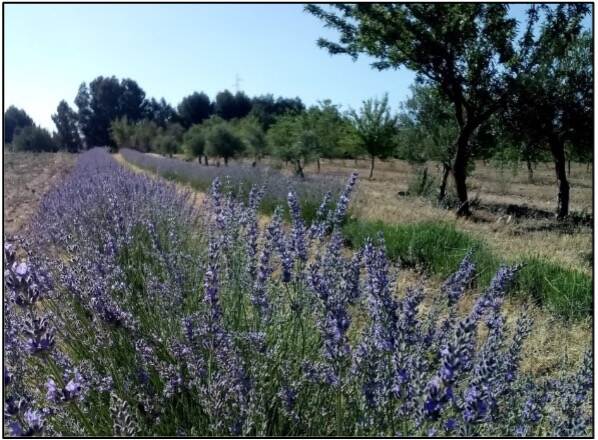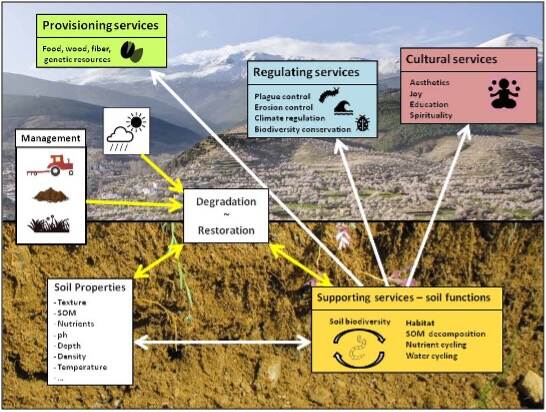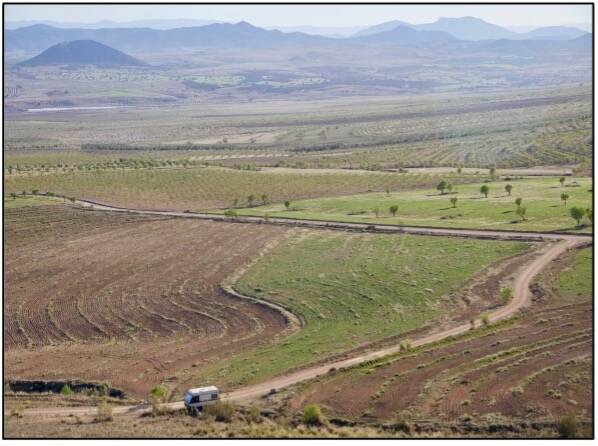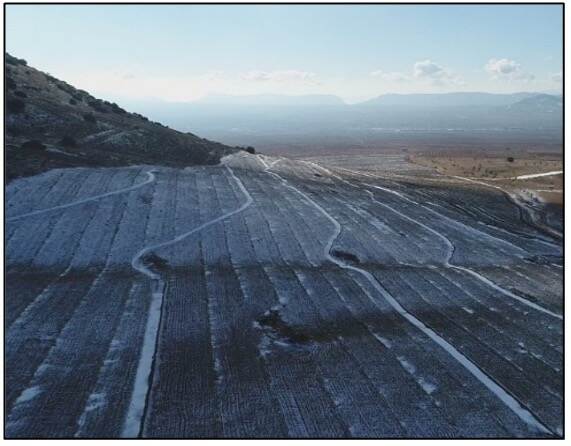Agroecology is a sustainable solution for Spain's agricultural sector
Nature-inclusiveness and agroecology not only help Spanish farmers deal with climate challenges, but they also create opportunities to enhance soil health, ecosystem services and agricultural productivity while preserving the natural environment. The knowledge and experience being developed in Spain, the laboratory of climate, might be needed in the future in a hotter and drier Netherlands.

The agricultural sector plays a significant role in Spain, with agriculture occupying nearly half the country. Of this, 33% is dedicated to farming practices, while 16% is used for meadows or pastureland. The largest agricultural areas in Spain are in Andalusia, Castilla-La Mancha, and Castilla y León. Among them, Andalusia leads the country in agricultural production and organic farming, making Spain the European leader in the latter field.
Challenges to the stability of the agricultural sector
Spain is an important exporter to the European Union, producing half of the European olive consumption and one third of its fruit consumption. Germany, France, and the United Kingdom are the country's largest export partners. Spain benefits from ideal conditions for agricultural production due to its climate, altitude, and erosion position.
However, the changing climate – characterized by high temperatures, limited rainfall, and more extreme weather events – poses challenges to the sector's stability. The tensions between productivity and sustainability result in short-term benefits but have long-term negative consequences for soil health. Spain has over 800.000 farmers, with approximately half of them operating farms of five hectares or less, leading to intense competition to achieve high yields and sell products at the lowest prices.
Solutions offered by agroecology
One potential solution for extensive agricultural areas could be nature-inclusive agriculture. Nature-inclusive agriculture is seen as a flexible transition pathway to move from current industrialized food and farming systems towards sustainable systems grounded in agroecology. Agroecology proposes specific actions to facilitate a paradigm shift towards environmentally sustainable, socially fair, economically viable, culturally appropriate, and resilient farming and food systems.
Agroecology encompasses beneficial agricultural practices that enhance soil functioning and deliver multiple ecosystem services. These practices include integrated pest management, cover crops and rotations, natural field hedges and buffer strips, and the use of innovative technologies to promote natural processes such as agroforestry systems, strip cropping, and reduced tillage.

‘Agroecology encompasses beneficial agricultural practices that enhance soil functioning and deliver multiple ecosystem services.’
Support of climate-smart agriculture by the Spanish government
The Spanish government supports climate-smart agriculture through the national strategic plan for the Common Agricultural Policy (CAP) Strategic Plan 2023-2027. This plan includes several measures to address climate challenges related to agricultural activities and achieve environmental goals set by the European Green Deal. One of the aims is to cultivate 20% of the country's agricultural land using organic farming practices by 2030. Additionally, more than 86% of the utilized agricultural area should comply with good agricultural and environmental conditions, while regions have reserved EUR 6 billion to incentivize farmers committing to more ambitious actions such as carbon sequestration and the maintenance of landscape features. Furthermore, EUR 540 million is allocated for interventions beneficial to climate, environment, and animal welfare, including forest fire prevention and the creation of biodiversity islands.
The plan also includes income support to reduce the risk of market instability. Through the implementation of ecoschemes, farmers will be encouraged to engage in interventions that are beneficial to climate, environment, and animal welfare.
Agroecological practices in woody crop farming
Agroecological practices are already being implemented on a local scale, as exemplified in the case of agroecological practices in woody crop farming on the High Steppe Plateau of southeast Spain. In this initiative, local farmers established the AlVelAl association in 2015 with the support of the Commonland Foundation, business entrepreneurs, regional governments, and research institutions. The aim is to restore extensive areas of degraded land, increase the productivity and biodiversity of degraded agroecosystems, enhance resilience to climate change, generate job opportunities, and promote social cohesion in the region within a 20-year timeframe. Key agricultural practices being implemented include the use of green manure, compost and organic amendments, reduced and no tillage, keyline design, swales, and intercropping with aromatic species.
To evaluate the impact of these practices on soil health in almond farms, a 4-year participatory monitoring project was initiated in collaboration with twelve local farmers and two research institutions. Results show how the implemented practices enhance critical soil health indicators, with combinations of practices proving more effective than individual ones. They also show that involving farmers in monitoring activities increases awareness and ownership of alternative farming practices, supporting the scaling up of innovations. Detailed results can be found in a PhD thesis by Luján Soto (Luján Soto, 2021; Participatory Monitoring and Evaluation of Regenerative Agriculture: From local knowledge and impacts to large-scale adoption).
The Embassy of the Netherlands in Spain is also working on a project improving soil quality. More information (in Dutch) can be found at Verbetering bodemkwaliteit centraal in samenwerking Spanje-Nederland

4 Returns Framework
Continuing their collaboration, Commonland and AlVelAl work together on landscape restoration through the 4 Returns Framework. This framework is a practical and tested system-change approach that can be used by stakeholders to adopt a landscape approach. It aims to balance competing stakeholder demands by incorporating different management approaches and business cases, providing a full range of inspirational, natural, social, and economic returns. The 4 Returns Framework is a valuable tool in achieving the goals of the UN Decade on Ecosystem Restoration, which focuses on restoring ecosystems and healing our relationship with nature.
Other practices implemented by local farmers in the southeast region of Spain include:
- designing plantations following contour lines and keyline design principles.
- implementing swales to increase water capture and reduce water flow to maximize infiltration across the entire farm surface.
- introducing aromatic strips on field hedges to promote biodiversity, natural pest control, crop diversification, and improve farm aesthetics.
- favoring natural vegetation covers helps minimize costs and enhancing farm resilience to the effects of climate change.


Promoting sustainable and resilient farming systems
Nature-inclusive farming practices and agroecological approaches allow the Spanish agricultural sector to address climate challenges and promote sustainable and resilient farming systems.

They align with the strategic plans and environmental goals of the Spanish government, creating opportunities for farmers to enhance soil health, ecosystem services, and agricultural productivity while preserving the natural environment.
Contact
Would you like to know more about the current developments in the domain of agriculture and nature in Spain or contact the agricultural team at the Netherlands Embassy in Spain?
You can visit the country page of Spain at the website agroberichtenlandbuitenland.nl of the Netherlands ministry of Agriculture, Nature and Food Quality. You can also send an email to MAD-lnv@minbuza.nl
This article is part of the latest edition of e-magazine Agrospecial (June 2023) about nature-inclusive farming. The teams of our Netherlands Agricultural Network showcase nature-inclusive practices and initiatives in 36 countries worldwide. They delve into the development, benefits and challenges of this innovative farming approach. Each team has a different story to tell. Click here to read more about insights into the potential of nature-inclusive farming practices worldwide!